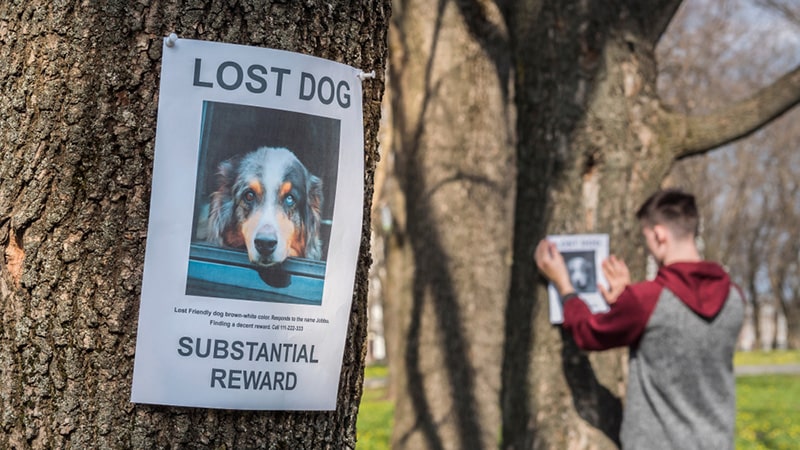In this article
The search may begin as soon as you discover your dog is lost, but the real question is: when is it time to stop looking for a lost dog? There’s no definite answer. It’s about your decisions and how far you want to go.

How Quickly Are Lost Dogs Found?
In the USA, about 10 million dogs are lost every year. However, only 15% of dogs without ID tags are reunited with their owners.1
Many lost dogs are found in the local neighborhood,2 and some manage to find their way home. While a license or ID tag helps owners find their lost dogs, some are found using tips from newspaper ads or “missing” flyers. Dogs that are reunited with their owners are often found within a few days of going missing.
The first few hours are crucial to finding your dog. This is when you should commit maximum effort with “missing dog” flyers and ads, neighborhood search groups, shelter calls, and social media posts. Most dogs are found quickly and within a few miles of where they went missing, so time is of the essence.

How Long Before You Should Give Up the Search?
There’s no question that you need to move fast when you realize your dog is missing, but knowing when to give up the search is a much harder decision. Here are some factors to consider:
1. Your Dog’s Age and Health
Unfortunately, your dog’s age and health affect how long they can survive outdoors. Younger dogs have more energy and agility, so they can dodge threats and find food and shelter more easily than older dogs. However, this also means that they can cover a lot of distance in a shorter period and may stray outside of a few-mile radius of your home.
Conversely, older dogs or dogs with health problems may have physical or mental limitations that impact their survival. They’re less able to fend off other dogs or wildlife that may pose a threat. But being older or less mobile, they may not travel as far or into unfamiliar areas.

2. Weather and Environment
The weather and environment are important considerations for when to stop looking. If your dog gets lost in your neighborhood or in a park where they’ve been often, they may find shelter or get food from familiar people and wait it out without wandering.
However, if your dog is missing on a vacation or a long hike in the woods, there are greater challenges and threats. Your dog may have to contend with wildlife and may struggle to find food, water, and shelter to survive for long periods.
Similarly, harsh weather conditions like a blizzard or heatwave add to the risks. Your dog may not be able to travel as far in a snowstorm, but finding warmth and food will be more challenging. Your dog may not be able to travel far in a heatwave, either, but water and shade are crucial to survive the high temperatures.
3. Time
Unfortunately, the longer a dog is lost, the lower the chances of a successful reunion. The first few hours are when your dog is likely to be close and safe.
While it can seem like forever, a week isn’t too long for a dog to be missing. They could’ve traveled a good distance and found food, water, and shelter to survive. However, it will be more challenging to track them.
As time goes on, the likelihood of having a hot trail dwindles. You shouldn’t necessarily give up, but it may not be practical to devote hours to searches on foot—especially if you no longer have any leads.
However, you can continue sharing on social media, calling local shelters and vet offices, and posting flyers. Some dogs are reunited after weeks or months because of a lucky break with a tip or a shelter mix-up.

4. Hope vs Reality
Emotions run high when your dog is lost. You may feel sad, anxious, or guilty. As time goes on, the situation may begin to feel discouraging.
You can adjust your search strategy. Instead of intense searches, balance your efforts with your day-to-day life to manage the emotional turmoil. Keep engaging with social media posts and contacting local shelters to stay hopeful.
It is important to manage your expectations, however. The longer your dog is missing, the greater the challenge of finding them. Accepting the reality of the situation is necessary to cope if you don’t get closure.
Never Give Up Hope Completely
There’s no right or wrong answer to when you should give up searching for your lost dog. There are miraculous stories of lost dogs being reunited with their owners after months—or even years. Some have even traveled miles to find their way home, while others were a matter of pure luck.
Ultimately, you don’t have to give up your search until you think it’s the right time. Even if you have to return to your normal responsibilities, you can continue with smaller search efforts and maintain hope.
See also:
Featured Image Credit: StockMediaSeller, Shutterstock






















